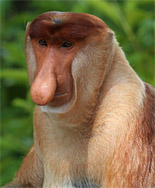Get
To Know
|
 The
Proboscis Monkey or long nosed monkey is a reddish brown arboreal
Old World monkey that is endemic to the southeast Asian island of
Borneo. They also go by the Malay name monyet belanda (Dutch monkey)
as Indonesians remarked that the Dutch colonisers often had similarly
large bellies and noses. Males have a maximum known weight of 30
kg while Females weigh 7 to 12 kg, with a maximum known mass of
15 kg. The large nose of the male can exceed 10.2 cm in length and
hangs lower than the mouth. They live most commonly in coastal areas
and along rivers. They favour dipterocarp, mangrove and riverine
forests. It is perhaps the most aquatic of the primates and is a
fairly good swimmer, capable of swimming up to 20 m underwater and
have been known to swim across rivers. They have a long coat; the
fur on the back is bright orange, reddish brown, yellowish brown
or brick-red. Their face is orange-pink and the male has a red penis
with a black scrotum. Both sexes have bulging stomachs that give
the monkeys what resembles a pot belly and many of the monkeys'
toes are webbed. Females become sexually mature at five years old
and copulations tend to last for half a minute with both sexes participating
although now always successfully. Perhaps this is because the male
will grab the female by the ankles or torso and mount her from behind.
It likely doesn't help that when soliciting sexual attention, both
sexes will pouted, the males will sometimes vocalize, the females
will present their backsides, and mating pairs are sometimes harassed
by subadults. Proboscis monkeys eat primarily fruit and leaves,
but will also eat flowers, seeds and insects to a lesser extent.
Their daily activities consist of resting, traveling, feeding and
keeping vigilant. As night approaches, the monkeys move back near
the river and forage again. The proboscis monkey is assessed as
Endangered and its total population has decreased by more than 50%
in the past 36-40 years to 2008 due to ongoing habitat loss and
hunting in some areas. The largest remaining populations are found
in Kalimantan; there are far fewer in Sarawak, Brunei and Sabah. The
Proboscis Monkey or long nosed monkey is a reddish brown arboreal
Old World monkey that is endemic to the southeast Asian island of
Borneo. They also go by the Malay name monyet belanda (Dutch monkey)
as Indonesians remarked that the Dutch colonisers often had similarly
large bellies and noses. Males have a maximum known weight of 30
kg while Females weigh 7 to 12 kg, with a maximum known mass of
15 kg. The large nose of the male can exceed 10.2 cm in length and
hangs lower than the mouth. They live most commonly in coastal areas
and along rivers. They favour dipterocarp, mangrove and riverine
forests. It is perhaps the most aquatic of the primates and is a
fairly good swimmer, capable of swimming up to 20 m underwater and
have been known to swim across rivers. They have a long coat; the
fur on the back is bright orange, reddish brown, yellowish brown
or brick-red. Their face is orange-pink and the male has a red penis
with a black scrotum. Both sexes have bulging stomachs that give
the monkeys what resembles a pot belly and many of the monkeys'
toes are webbed. Females become sexually mature at five years old
and copulations tend to last for half a minute with both sexes participating
although now always successfully. Perhaps this is because the male
will grab the female by the ankles or torso and mount her from behind.
It likely doesn't help that when soliciting sexual attention, both
sexes will pouted, the males will sometimes vocalize, the females
will present their backsides, and mating pairs are sometimes harassed
by subadults. Proboscis monkeys eat primarily fruit and leaves,
but will also eat flowers, seeds and insects to a lesser extent.
Their daily activities consist of resting, traveling, feeding and
keeping vigilant. As night approaches, the monkeys move back near
the river and forage again. The proboscis monkey is assessed as
Endangered and its total population has decreased by more than 50%
in the past 36-40 years to 2008 due to ongoing habitat loss and
hunting in some areas. The largest remaining populations are found
in Kalimantan; there are far fewer in Sarawak, Brunei and Sabah.
|
|
|
|
When I'm not feeling relevant
enough, I tell my neighbors
about how I dated the mayor
when he was still a candidate.
Well, okay, it was just one date,
but we had been phone tagging
for months, trying to coordinate
a time that wouldn't conflict with
ribbon-cuttings, three-mile jogs
alongside Senate hopefuls, council
meetings, dreams of emblazoning
his name on a city street sweeper.
At a bar in a neighborhood outside
of my budget, he ordered us beer
and two cheese pizzas so personal
I wasn't sure how to interpret them.
"I'm running for mayor in 2013,"
a year I should have included
in my five-year plan to be happy
and exhaust all eligible bachelors.
Tell me: what do you think happens
when a beloved councilman
takes you to a local bar
just blocks from his apartment?
"Mr. Councilman!" The chorus
of cold-to-me voices cooled
his pie to a gummy slab of gluten
while I ate. "This is my friend."
I could feel their assessments:
how dare she not be too ambitious
to eat! Could she be the one
the press will one day get to meet?
Laryssa Wirstiuk lives in Jersey City, NJ with her mini
dachshund Charlotte Moo. Laryssa’s literary preoccupations include fruit,
gemstones, and coastal states in summer. Her poetry, fiction, and creative
nonfiction have been published in Gargoyle Magazine, Word Riot, Barely
South Review, and Up the Staircase Quarterly. http://www.laryssawirstiuk.com
|
 The
Proboscis Monkey - Issue Twenty-Two
The
Proboscis Monkey - Issue Twenty-Two